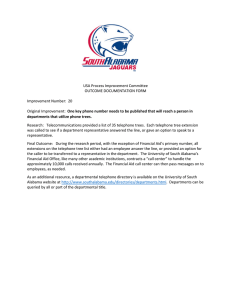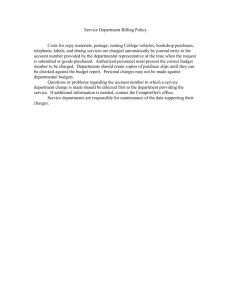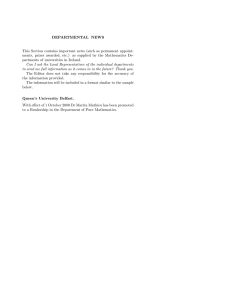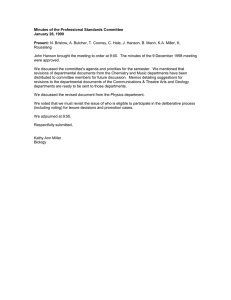A U ssessment
advertisement
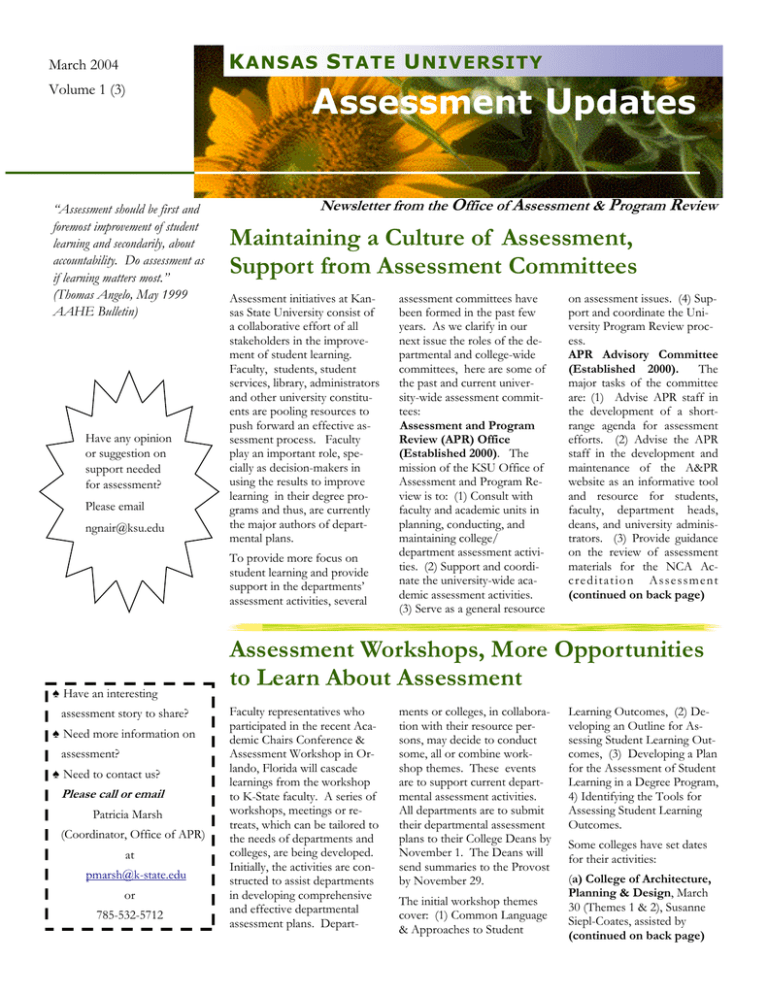
K ANSAS S TATE U NIVERSITY March 2004 Volume 1 (3) “Assessment should be first and foremost improvement of student learning and secondarily, about accountability. Do assessment as if learning matters most.” (Thomas Angelo, May 1999 AAHE Bulletin) Have any opinion or suggestion on support needed for assessment? Please email ngnair@ksu.edu Assessment Updates Newsletter from the Office of Assessment & Program Review Maintaining a Culture of Assessment, Support from Assessment Committees Assessment initiatives at Kansas State University consist of a collaborative effort of all stakeholders in the improvement of student learning. Faculty, students, student services, library, administrators and other university constituents are pooling resources to push forward an effective assessment process. Faculty play an important role, specially as decision-makers in using the results to improve learning in their degree programs and thus, are currently the major authors of departmental plans. To provide more focus on student learning and provide support in the departments’ assessment activities, several ♠ Have an interesting assessment story to share? ♠ Need more information on assessment? ♠ Need to contact us? Please call or email Patricia Marsh (Coordinator, Office of APR) at pmarsh@k-state.edu or 785-532-5712 assessment committees have been formed in the past few years. As we clarify in our next issue the roles of the departmental and college-wide committees, here are some of the past and current university-wide assessment committees: Assessment and Program Review (APR) Office (Established 2000). The mission of the KSU Office of Assessment and Program Review is to: (1) Consult with faculty and academic units in planning, conducting, and maintaining college/ department assessment activities. (2) Support and coordinate the university-wide academic assessment activities. (3) Serve as a general resource on assessment issues. (4) Support and coordinate the University Program Review process. APR Advisory Committee (Established 2000). The major tasks of the committee are: (1) Advise APR staff in the development of a shortrange agenda for assessment efforts. (2) Advise the APR staff in the development and maintenance of the A&PR website as an informative tool and resource for students, faculty, department heads, deans, and university administrators. (3) Provide guidance on the review of assessment materials for the NCA Accreditation Assessment (continued on back page) Assessment Workshops, More Opportunities to Learn About Assessment Faculty representatives who participated in the recent Academic Chairs Conference & Assessment Workshop in Orlando, Florida will cascade learnings from the workshop to K-State faculty. A series of workshops, meetings or retreats, which can be tailored to the needs of departments and colleges, are being developed. Initially, the activities are constructed to assist departments in developing comprehensive and effective departmental assessment plans. Depart- ments or colleges, in collaboration with their resource persons, may decide to conduct some, all or combine workshop themes. These events are to support current departmental assessment activities. All departments are to submit their departmental assessment plans to their College Deans by November 1. The Deans will send summaries to the Provost by November 29. The initial workshop themes cover: (1) Common Language & Approaches to Student Learning Outcomes, (2) Developing an Outline for Assessing Student Learning Outcomes, (3) Developing a Plan for the Assessment of Student Learning in a Degree Program, 4) Identifying the Tools for Assessing Student Learning Outcomes. Some colleges have set dates for their activities: (a) College of Architecture, Planning & Design, March 30 (Themes 1 & 2), Susanne Siepl-Coates, assisted by (continued on back page) Page 2 Assessment Updates Assessment, Support … Workshops… (from page 1) Cia Vershelden (Arts & Sciences). 2) College of Technology & Aviation, April 6 & 20, 12:30-1:30 pm (Themes 1 & 2), Troy Harding, assisted by Patricia Marsh (APR), at Salina Campus. (3) Campus-wide, April 15, 1:30-2:30 pm (Theme 1) and April 16, 8:30-9:30 am (Theme 2), Patricia Marsh, at Student Union, Rm. 213. Please contact the APR Office to register (532-5712). Additional representatives creating activities from the Orlando conference are: Tara Baillargeon (Hale Library), Kristina Boone (Communications), Ronald Downey (APR), Stephen Kiefer (Psychology), Kelly Liu (Geology), and Carmel Parker White (Human Ecology). full-site (2001) and the focused visit in 2005. (4) Consult with APR staff in the review of final reports from the Minigrant program and any other efforts to increase faculty involvement in assessment activities. The Mini-grant program is currently on hold due to financial restrictions. Student Learning Outcomes Task Force Committee (Dec. 2002 – April 2003). The committee identified processes and procedures for: degree program. Discussion groups among faculty and department heads were conducted. The ‘Early Adopters’ Committee, has initiated an online Assessment Manual for the departments. (4) The development of the methods, to be used by departments, to improve programs based on the results of assessments. These have been shared by the ‘Early Adopters’ through the Assessment Program Review website and faculty discussion groups. (1) Reviewing the revised University-wide student learning outcomes. After campus-wide discussion, these are to be considered by the Faculty Senate in their April 2004 meeting. (2) The development of student learning outcomes by departments for each degree program. Almost all degree programs have submitted their learning outcomes as of Dec. 1, 2003. Feedback loops are currently being identified to review departmental outputs such as learning outcomes, departmental assessment plans and progress reports. (3) Identification of appropriate assessment procedures by departments, including measures of student learning for each Early Adopters Work Group (Oct. 2002-Nov. 2003) The objectives for this committee were: (1) To identify model student learning outcomes (SLOs) programs at K-State. (2) To mentor academic and student service units in their efforts to develop SLOs. These were accomplished through a variety of means including department & college presentations by Cia Vershelden and rotating membership within this committee. (3) To identify and/or help departments and units develop assessment for SLOs. (4) To aid Student Services and other support areas, with the development of on-going assessment programs. Volume 1 (2) (from page 1) The objectives were accomplished through sharing of expertise and information among various departments. Currently, the library is developing ways to help define and assess information literacy, and how they can be of assistance to departments in the assessment process. The Office of Institutional Advancement, in recognition of the importance of out-ofclassroom experiences to student learning, have defined learning outcomes they would like students to achieve and advance. Institutional Advancement Student Services units include Academic Assistance Center, Academic and Career Information Center, Admissions, Adult Student Services, Career Employment Services, Counseling Services, Office of Student Life, Disabled Student Services, Educational Support Services, Financial Assistance, Greek Affairs, Housing & Dining Services, Lafene Student Health Center, International Students, Minority Student Services, Recreation, Religious Activities, Student Activities, Student Union, Trio Programs, and Women’s Center. Regents Assessment Conference K-State faculty and staff will have the opportunity to learn more about the practice of assessment of student learning. The Kansas Board of Regents and the Systemwide Council of Chief Academic Officers (SCOCAO) is sponsoring the Regents Assessment Conference on Fort Hays State University on April 8, 2004, from 8:30 am-4:30 pm. The conference will bring together experts and practitioners of assessment from various colleges and universities around Kansas. Dr. Peter Ewell, a renowned expert on outcomes assessment, will be the keynote speaker. Some session titles included in the conference are: Experiments in Assessing General Education: Successes and Failures; Course-Embedded Assessment; Using the Teacher Work Sample to Assess Student performance; Long-Term Success in Assessing Graduates; Developing Your Own Humanities Assessment Exam; Forcing Ourselves to Link Curriculum with Assessment: The Affinity Diagram Project; Using Institutional Data from Program Assessment.; Findings from our General Education and Senior Surveys. Please contact Connie Manzo (mcdmanzo@ksu.edu) at 532-5712 if you are interested in attending the conference. The conference registration fee is FREE for the first 25 participants who sign-up at the Assessment & Program Review Office (532-5712).
